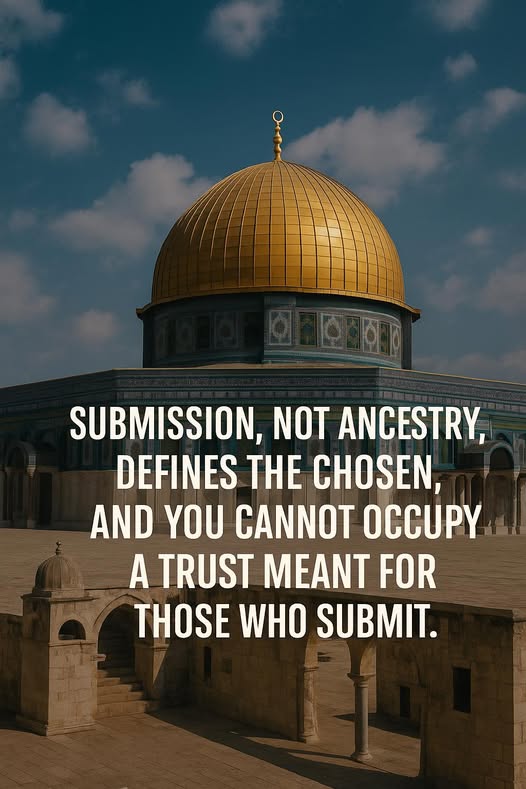
In the divine system outlined in “The Architecture of Submission,” religion is not a cultural artifact or a tribal identity—it is a structured way of life anchored in surrender to the will of the Creator. With this framework in mind, the ongoing conflict over Jerusalem and Palestine must be re-examined not as a political dispute alone, but as a spiritual consequence of rejected responsibilities and revoked privileges.
From Divine Appointment to Revoked Custodianship
Historically, the Children of Israel were entrusted with the divine mission: to uphold monotheism, preserve revelation, and act as witnesses to God’s guidance. They were given prophets, laws, and miracles—a position of immense honor and weight. However, over time, they repeatedly violated their covenant, distorted scriptures, and opposed messengers, even seeking to kill Jesus, the Messiah sent to them.
In response, two significant decrees were made according to the Qur’an regarding the Israelites:
First, it was declared that their opportunity for redemption had come to an end, and from that point on, those who followed Jesus would have dominion over them until the Day of Judgment:
“[Mention] when Allah said, ‘O Jesus, indeed I will take you and raise you to Myself and purify you from those who disbelieve and make those who follow you superior to those who disbelieve until the Day of Resurrection.’”
— Qur’an 3:55
Second, it was affirmed that although the Jewish people were originally chosen by God, their fate would differ from that of other ancient communities that faced total destruction—such as the people of Lot, Noah, and Aad. While their national punishment occurred in 70 CE with the destruction of the Temple and the dispersal of their people, their unique status as former witnesses to God’s message meant that:
“And [remember] when your Lord declared that He would keep sending against them those who would afflict them with a dreadful torment until the Day of Resurrection.”
— Qur’an 7:167
This decree ensures that individuals and nations will continue to rise against them as instruments of divine consequence time to time (e.g. due to wickedness and anti human activities of few). This process will persist until the Day of Judgment—unless they choose to repent, turn back to God, and accept Jesus as the Messiah. Their destiny has now reached this point, with only repentance and sincere spiritual return remaining as an option.
The Middle Nation: Transfer of Responsibility
Following their final rejection of the message, the responsibility to carry forward the religion of submission was transferred to the descendants of Ishmael through the Prophet Muhammad. The Qur’an describes this new nation as:
“And thus We have made you a middle nation, so that you may be witnesses over humanity, and the Messenger a witness over you…”
— Qur’an 2:143
Muslims now bear the mantle of being God’s living testimony to the world. They are tasked not with conquest or coercion, but with spreading the divine message of submission through wisdom, compassion, and upright character. This responsibility is spiritual, moral, and universal—open to anyone who surrenders sincerely to God.
The Claim to Jerusalem: Without Responsibility, There Is No Right
The ongoing attempt by the modern state of Israel to claim exclusive rights over Palestine and Jerusalem—and to empty the land of Palestinians, many of whom still carry the torch of divine responsibility—is not simply political. It is a theological contradiction.
You cannot occupy a land that was meant for those carrying God’s message while rejecting both the final prophet and the Messiah you were sent. If the Children of Israel wish to reclaim divine authority, they must begin by accepting Jesus as their Messiah and Muhammad as the Seal of the Prophets.
To persist otherwise is to step into a role only God can hold—claiming privilege without responsibility, power without submission, and land without allegiance to the One who made it sacred. This is not merely injustice; it is spiritual rebellion.
Jerusalem and Palestine: A Sacred Trust
Jerusalem is not a prize of war. It is a sacred trust given to those who uphold divine responsibility. Just as God stripped the land from the Israelites in the past due to corruption, He can and will do so again. Sacred geography cannot be divorced from sacred purpose.
Muslims must also remember: holding this responsibility is not a mark of superiority but a test. If Muslims too corrupt the earth, spread injustice, and violate divine ethics, they will face similar consequences. The divine practice is consistent—favor is never unconditional.
Conclusion: Occupation Without Submission Is Delusion
The land of Palestine, and especially Jerusalem, belongs not to ethnicity or nationalism but to the mission of monotheism. The Children of Israel, having rejected both Jesus and Muhammad, no longer hold a divine claim. Muslims, as the middle nation, carry the burden today—but not as owners, as trustees.
This is why Palestine holds such significance in religion; it was initially chosen by God as the first center of monotheism, which lasted for approximately 1500 years. However, after Mecca became the focal point of monotheism, Palestine lost that status. Additionally, the Jewish people are not tasked with bearing witness to the world about God, as they are under divine punishment until the Day of Judgment—unless they choose to repent and accept both Jesus and Muhammad, the final messenger. If the Jews do not adhere to these principles, the matter is closed from God’s perspective. The resolution of the Palestinian issue hinges on their acceptance of Jesus and Muhammad. God has now designated the children of Ishmael, who call themselves Muslims, to fulfill the role of witnesses. Anyone who accepts their invitation becomes part of the chosen nation.
Submission, not ancestry, defines the chosen, and you cannot occupy a trust meant for those who submit.

